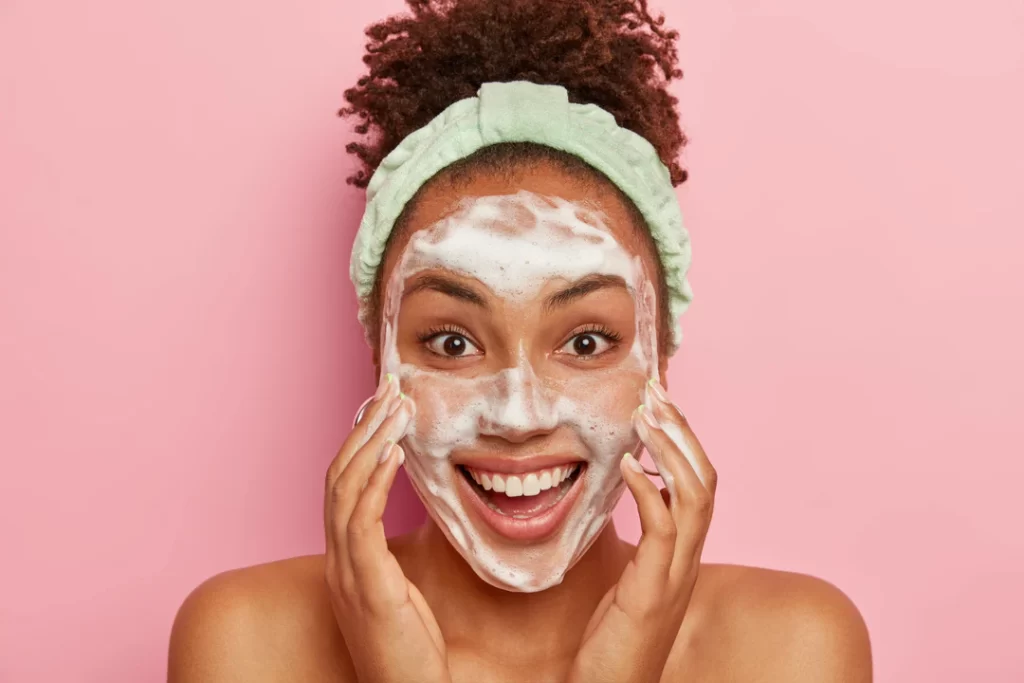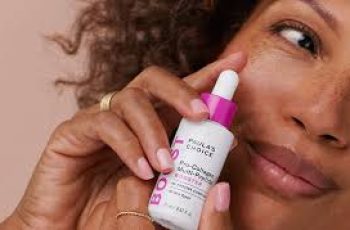
Is Salicylic Acid Good?
Salicylic acid is a member of the group of chemical exfoliants known as Beta Hydroxy Acids (BHA) derived from willow bark you’ll find this potent powerhouse formulated into acne targeting skincare products.
It’s an oil soluble ingredient meaning it can penetrate down into the lower layers of the dermis and work at unclogging the pores of dirt, bacteria, and build-up of excess sebum that when left untreated will develop into blackheads, whiteheads, and other blemishes.
It also contains anti-inflammatory and antibacterial properties resulting in it help to reduce and calm any existing breakouts and inflammations, whilst preventing any new ones from forming.
If you are wanting to know a little more details about salicylic acid and how it works on the skin, check out our dedicated blog post.
Is it bad to use salicylic acid every day?
Not really, but only if you use it correctly in your routine and avoid teaming it with other potent formulations that can cause the skin to become overly dried and irritated. To avoid overdoing it with salicylic acid, it is recommended to introduce salicylic acid slowly to your routine to begin with. Try applying it every other day and keep an eye on how your skin reacts to this, once the tolerance is built you can use it more frequently, especially if you have a skin type that is oily and prone to acne.
When using salicylic acid daily you should consider the product formula you apply to the skin. What I mean by this is using a toner or face wash enriched with salicylic acid are rinsed off the skin resulting in them not causing too much irritation, this is the best way of using the BHA twice a day with little to no concerns with negative side effects. If you are wanting to pack a bit more of a punch you can use a serum containing salicylic acid will remain on the skin for a longer amount of time, ideally in the evenings so it can set to work whilst you catch up on your well-deserved beauty sleep.
If you have a skin type that is more sensitive, or suffers from certain skin conditions such as rosacea, you’re pregnant, or on specific mediations it is best to avoid using salicylic acid all together. You may be able to introduce other chemical exfoliants, such as lactic acid or other types of poly hydroxy acids (PHA) once you have checked with a doctor or dermatologist that you are safe to do so.
Why shouldn’t you use salicylic acid?
You shouldn’t use salicylic acid if you have a skin type that is dry and prone to sensitivity. Although the BHA is generally considered safe to use, it can be too potent for certain skins and will often result in several side effects, from discomfort, dry patches of skin, redness, flaky patches of skin, and irritation. You will also find that the salicylic acid when used in excess can strip the skin of the vital oil. It needs this to remain comfortable and the skin barrier functioning properly to protect itself from exposure to free radicals, such as pollution, UV rays, and other environmental aggressors.
Before applying any type of product containing salicylic acid, you need to perform a patch test for 24 hours before, especially if it is the first time you are introducing the acid into your routine.
What does salicylic acid do to your skin?
There are many benefits provided by salicylic acid that is delivers on the skin, here are some of the main ones experienced by those who introduce the potent powerhouse to their daily routine.
Salicylic acid is oil soluble and can penetrate deep into the lower layers of the skin, into the pores to clear them out of bacteria, dirt, and excess sebum.
Salicylic acid can slough away the build-up of dead skin cells revealing new, vibrant skin underneath.
Salicylic acid contains anti-inflammatory and antibacterial properties helping to maintain a calm, soothed skin.
Salicylic acid is able to regulate the production of sebum in the skin keeping it balanced and healthy.
Salicylic acid can work on the outer surface of the skin combating active spots, helping to reduce their size whilst preventing anymore from developing.
There you have some examples of what salicylic acid does for the skin. There is more about how the BHA works on the skin over on our Skin School page, check it out to find out more.
Is salicylic acid a good toner?
Absolutely! In fact, toners are considered the most popular and effective formula that many skincare fans prefer to use. By using a toner you’ll find that the skin will reap the rewards of the various benefits salicylic acid is able to delivery to the skin without the worry of stripping it of vital oils and water. To avoid any signs of irritation or dryness you can also follow your salicylic acid toner with a serum packed with hydrating ingredients, such as hyaluronic acid and niacinamide.
Does salicylic acid remove blackheads?
Yes, it certainly does, combating blackheads is one of the many blemish battling benefits salicylic acid is able to deliver. Because the BHA can work its way into the lower layers of the skin it can reach the root of the problem regarding blackheads, and that is clogged pores. A build-up of bacteria, dirt, excess sebum, and other impurities that can lead to blackheads, whiteheads, spots, and flare-up in acne too.
We go into a lot more detail about using salicylic acid to treat blackheads, so check out our dedicated blog post to find out more.
Should I use salicylic acid in the morning or night?
You can use salicylic acid twice a day if you have built a tolerance for the potent BHA. By using it in your morning routine you’ll find it is able to rid the skin of any barrier caused by the layer of dead skin cells ensuring it is able to absorb other products applied on top. For the evening, you will slough away any impurities, bacteria, and debris you picked up during the day resulting in a fully cleansed skin.
There you have a little more information and with any luck I have answered the question, is salicylic acid good? Don’t forget to join us over on Instagram for daily skin tips, product launches, and exclusive discounts.
DQH Knowledge drop: In your 20s, your skin cell turnover decreases. (Cell turnover is a key component in keeping your skin youthful.) You know what else slows down? Your collagen production. Starting in your 20s, collagen decreases by about 1 percent per year. Should you want to prevent fine lines and wrinkles, start by eliminating behaviors that contribute to premature aging. “If it’s bad for you, it’s bad for your skin,” says dermatologist Michel Somenek.
“Cigarette smoking reduces blood flow to the skin and causes premature wrinkling and a dull skin texture. Making the repeated pursed motion to inhale can also cause smoker’s lines. Alcohol and recreational drugs are toxins for the skin that damage its cellular structure and DNA,” Somenek tells us. “The faster you eliminate vices while you are young, the better chance your skin and body have to recuperate.” Also, adopting an anti-aging routine in your 20s is key. After all, the best offense is a good defense. We spoke to Somenek and experts Joshua Ross and Audrey Kunin to find out more.
Keep reading for the best anti-aging products for your 20s, according to skincare professionals.
Sunscreen
“We all know that the sun is the number one cause of skin aging and starting the prevention in your 20s is very important,” Ross says. “The majority of your sun damage won’t start to appear until you’re in your 30s, so don’t wait until you see it surface or you’ll be behind the curve. Stay ahead of it with a good-quality zinc-based sunscreen worn daily.”
Farmacy Green Defense Daily Mineral Sunscreen
An invisible sunscreen with SPF 30, plus botanical extracts meant to protect skin with tons of antioxidants. Bonus: It’s clean and fine to use under makeup.
Bareminerals Complexion Rescue™ Tinted Moisturizer Broad Spectrum SPF 30
Although we recommend you use your SPF and moisturizer separately, we also understand moments when you don’t have time or energy for that extra step. For those times, this bareMinerals moisturizer is a great thing to have on hand.
Vitamin C Serum
“A great introduction to anti-aging is to start with a vitamin C serum in your morning skincare routine,” Ross says. “It’s a powerful antioxidant that will neutralize free radicals and brighten the skin.” He adds that it’s a great way to counteract the effects of the sun’s harmful rays, which, as previously mentioned, are among the biggest causes of premature aging.
Drunk Elephant C-Firma™ Vitamin C Day Serum
The Drunk Elephant C-Firma is a lightweight serum that promises to give skin a glow by combining the brightening powers of vitamin C with ferulic acid, l-ascorbic acid, and vitamin E. The included sodium hyaluronate is meant to replace hydration loss, so you shouldn’t have to deal with any irritation.
Sunday Riley C.E.O. Rapid Flash Brightening Serum
This potent serum is jam-packed with vitamin C (15 percent, to be exact), which means it’s a potential superstar at both brightening skin and dousing it in antioxidants.
Peptides
Using peptides on your skin has many benefits, says Somenek. “The skin barrier is what defends the body against pollution, UV rays, bacteria, and toxins. It can be damaged by several everyday factors. Using topical peptides aids in building a stronger barrier,” he says. “Peptides comprise elastic fibers, which are a type of protein. These fibers help to make skin appear taut and firm. Peptides can also help repair damaged skin, relieve inflammation, and even out skin tone. Some peptides can kill acne-causing bacteria that is common in 20-somethings.”
Kunin agrees, saying, “Peptides are an excellent entry point for supporting collagen.” She recommends looking for face and eye treatments that contain these collagen-boosting powerhouses.
Charlotte Tilbury Magic Eye Rescue Cream
This Charlotte Tilbury super-emollient eye cream has a base of coconut oil and shea butter (read: it’s incredibly hydrating). Botanicals plus peptides are meant to help reduce dark circles and boost collagen, respectively.
This creamy moisturizer serves up potent collagen-boosting peptides and pycnogenol, and antioxidant-rich vitamin C. “Instead of sitting on top of the skin, peptides penetrate the outer layer so they go deep. The ‘signals’ they send tell the cells to produce elastin and collagen, which are needed for youthful-looking skin,” explains Somenek.
At-Home Peel Pads
Remember that skin cell turnover fiasco we talked about earlier? One way to help support it is by exfoliating. “Exfoliation is important to help keep skin fresh and luminous,” Kunin says. She recommends using at-home peel pads as an easy and effective way to exfoliate.
“The goal in your 20s is to fight the slowing pace of cell turnover. It is wise to use products that gently exfoliate, yet still remove oil and other impurities. Products that have Alpha Hydroxy Acids (AHA) or Beta Hydroxy Acids (BHA) are a good choice.”
According to Somenek, you should only exfoliate two to three times a week. “People of all ages are guilty of over-exfoliating and that can be too much of a good thing,” he says.
Dermadoctor Kakadu C Intensive Vitamin C Peel Pad
A few swipes of this Derma Doctor powerful peel pad promise to leave your skin glowing and smooth, thanks to the seven (yes, seven) types of chemical exfoliants, including AHA and BHA. It also contains vitamin C via Kakadu plum extract for added brightening and antioxidant protection.
KEY INGREDIENTS Kakadu plum extract is sourced from the Kakadu plum, a fruit grown in northern Australia. It contains vitamin C, which restores the skin’s natural barrier, increases collagen production, and soothes irritation.
Dr. Dennis Gross Skincare Alpha Beta® Universal Daily Peel Pads
These are the gold standard of peel pads, with a cult following and over 900 five-star reviews on Sephora. They’re easy to use and contain a blend of anti-aging exfoliating acids.
Emollient Night Cream
“In your 20s, you need to start upping the hydration in your skincare routine. You may have been cautious of over-moisturizing because of acne in your teens, but as you enter your 20s, your skin transitions and becomes drier,” Ross says. “I recommend an emollient night cream added into your evening skincare regimen.”
“Twenty-somethings need to make sure that they are not using creams that will clog their pores and cause excess oil production,” says Somenek. Opt for non-comedogenic products.
Cerave Skin Renewing Night Cream
One great choice is the CeraVe Skin Renewing Night Cream, which is a non-comedogenic night cream that leaves skin soft and glowy. It combines the moisturizing powers of ceramides and hyaluronic acid.
RoC Retinol Correxion Max Hydration Creme
“The best night cream ingredients contain retinol, benzoyl peroxide, and/or salicylic acid or hyaluronic acid. The goal is to moisturize, yet remove excess oil,” says Somenek. This Roc Retinol Correxion cream fits the bill as it contains both hyaluronic acid and retinol so it promises to moisturize while also being non-comedogenic.


